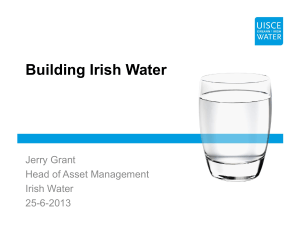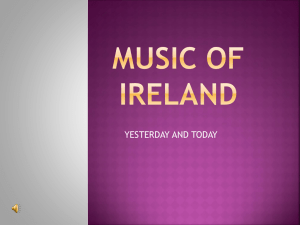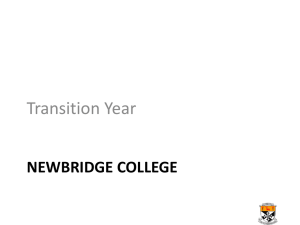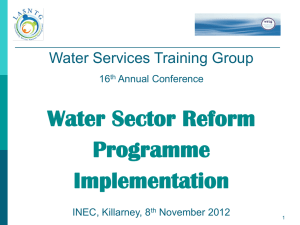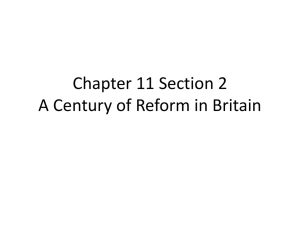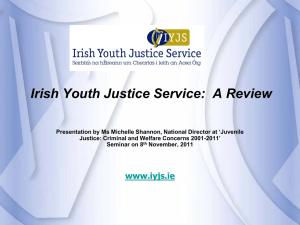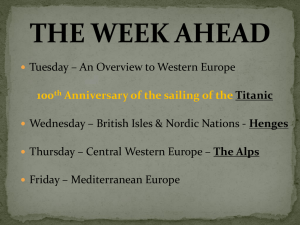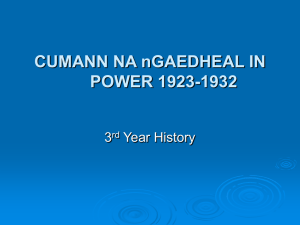Water Services * a business perspective
advertisement
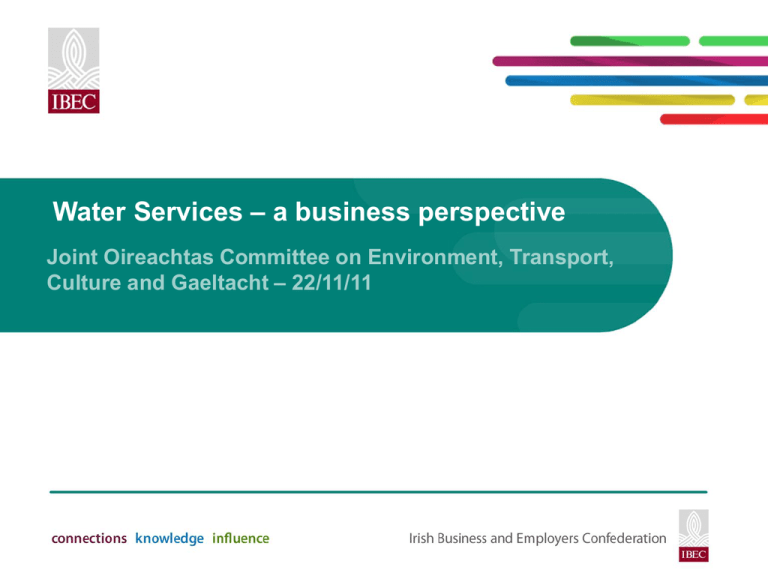
Water Services – a business perspective Joint Oireachtas Committee on Environment, Transport, Culture and Gaeltacht – 22/11/11 Water Services – a business perspective Overview Remit of IBEC’s Environment Policy Unit Water and waste water services used by businesses Water services delivery – some business concerns Our members’ views on ‘Irish Water’ Conclusion Water Services – a business perspective Who we are IBEC – National voice of business and employers – Over 7,000 members – Organised into Sectors, Regions and Policy Units Energy & Environment Policy Unit incorporates: – Energy Policy Committee – Environment Policy Committee (+ Water Working Group) – Green Business Executive (supporting EPA’s NWPP) Water Services – a business perspective Water and Waste Water Services – critical to business Investment decisions – Plentiful supply can be crucial in attracting FDI – Likewise, adequate effluent treatment capacity Raw Material – Manufacturing processes, embedded in products Business continuity – Consumption, sanitation Water Services – a business perspective Water and Waste Water Services – what business needs Security of supply – Water supply and waste water treatment capacity Quality – High standards, critical for key industry sectors Competitively-priced services – In line with international competitors Sustainably managed resource – Protect Ireland’s competitive advantage Water Services – a business perspective Current water services delivery – fit for purpose? Strengths Weaknesses Local involvement Fragmented structures, duplication and a potential lack of continuity Staff competence and commitment Insufficient and uncertain funding Leaking, corroding network Opportunities Threats Rationalisation of structures Possible failure of key supply assets Integrated management Possible disincentive to new manufacturing plant investment Ability to plan strategically Retirement (and non-replacement ) of skilled staff Water Services – a business perspective Water Services Delivery – business concerns Structure and Cost of System – Fragmentation unavoidably gives rise to duplication – This results in an inefficient system – In aggregate, substantially more costly for the Local Authorities to operate than it should be? Water Services – a business perspective Water Services Delivery – business concerns (1) Charges for Water Services are poorly understood – Local Authority non-domestic tariffs are mostly based on a “Water In/Water Out” principle – However, there is no transparency about how LAs price their water and waste water services to the business sector: • Partly due to a lack of appropriate accounting systems • Partly due to a lack of appropriate economic regulation – Difficult for commercial water users to know whether these charges reflect efficiently-incurred capital and operating costs Water Services – a business perspective Water Services Delivery – business concerns (2) Charges for Water Services are inconsistent – Wide regional variation in volumetric charges • Consolidated water and waste water tariffs for nondomestic users for 2011 range from €1.50 to €3.00 – But tariff harmonisation (whether across regions or across different types of end-user) means “winners and losers” • Need to ensure that the competitiveness impact on potential and existing large water users is understood Water Services – a business perspective Water Services Delivery – business concerns (3) Funding is a critical issue – Sufficient and affordable capital funding for a significant future investment programme Security of supply is not good – Coping with extreme weather events – Creaking infrastructure – possible disruption (esp. Dublin) – Seasonal and longer term capacity constraints Service levels are variable – Consistency needed on a national basis Strategic planning is not facilitated – Need for long term planning, but WSI Programme is short term Water Services – a business perspective Irish Water Independent two-stage assessment of the proposed transfer of responsibility for water services from the local authorities to a national entity – Consultation so far on phase 1 (utility vs. investment model) – One (collective) submission invited from the business sector Getting this wrong could have long term consequences – – – – Were any other feasible structural options considered? Further early consultation and engagement is vital Notwithstanding Troika constraints, “make haste slowly” Especially, avoid lock-in to a sub-optimal model Water Services – a business perspective Irish Water (continued) A number of strengths and weaknesses inherent in the two main structural options being examined: Strengths Weaknesses Utility Model Investment Model Efficiencies Quicker to establish More readily self-financeable Simpler economic regulation? Complex transition with attendant risks More duplication, limited scope for improvements e.g. possible loss of specialist skills Weak control of revenue collection Higher cost of capital? Water Services – a business perspective Remit for Irish Water – key principles (1) Rationalise structures in order to improve operating efficiencies The self-financing entity must achieve a low cost of capital for funding of future water service investment programmes Long-term decisions on tariff structure, and expenditure approvals for major investment programmes (e.g. universal domestic metering) should be made by an independent economic regulator Any financial support for domestic users could be targeted through social welfare rather than a universal ‘free allowance’ – More cost-effective – Less distortionary (~75% of total costs are fixed in the short run) Water Services – a business perspective Remit for Irish Water – key principles (2) Although in public ownership, the entity should be able to leverage private sector finance and expertise. – The Design/Build/Operate model is working very well in several regions - further roll-out could be encouraged. Governance and coordination of environmental regulation and supervisory functions on a River Basin District basis Promotion of Demand Side Management – Water conservation and efficiency measures – Irish Water becomes a key player in the NWPP Water Services – a business perspective Conclusion Secure, reliable and affordable water services are critical to Irish businesses and inward investment A modernised and efficient system is urgently needed Irish Water has the potential to deliver this, but various risks need to be identified and managed Business users will pay their fair share of the full cost of an efficient, well-regulated system But we are concerned about cost-competitiveness under the new regime if those efficiencies don’t materialise Water Services – a business perspective Next steps We welcome the Minister’s recent suggestion of a further (short) consultation period We hope this will include an early opportunity to comment on the findings of the consultants’ review IBEC will be seeking a bilateral meeting with DECLG Thank You

